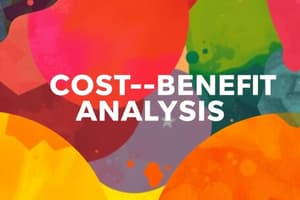Podcast
Questions and Answers
What is a primary category of benefits recognized in project management?
What is a primary category of benefits recognized in project management?
- Economic Benefits (correct)
- Artistic Benefits
- Environmental Benefits
- Social Benefits
Which phase is NOT typically included in the project life cycle?
Which phase is NOT typically included in the project life cycle?
- Modularization (correct)
- Completion
- Initiation
- Execution
What benefit might be considered when evaluating a project's long-term impact?
What benefit might be considered when evaluating a project's long-term impact?
- Sustainability improvements (correct)
- Increased staffing costs
- Higher taxes
- Short-term revenue spikes
What is an essential outcome of assessing project benefits?
What is an essential outcome of assessing project benefits?
Which of the following is an indirect benefit of a project?
Which of the following is an indirect benefit of a project?
Flashcards
Tangible Benefits
Tangible Benefits
These are tangible outcomes resulting from a project, like increased production, reduced expenses, or improved product quality.
Intangible Benefits
Intangible Benefits
These represent intangible advantages like enhanced reputation, boosted morale, or improved customer satisfaction.
Project Life Cycle
Project Life Cycle
The complete journey of a project from its initial conception to its eventual termination.
Definition Phase
Definition Phase
Signup and view all the flashcards
Implementation Phase
Implementation Phase
Signup and view all the flashcards
Study Notes
Project Benefits
- A project benefit is an outcome of the project, perceived as a positive change by one or more stakeholders.
- Benefits must be achievable and approved by key stakeholders.
- Project benefits are not deliverables. Deliverables are the means to achieve benefits (e.g., a computer system is a deliverable, not a benefit).
- Deliverables are final outputs transferred to a third party (customer, beneficiary, or performing organisation).
- Project deliverables cannot be used to measure the benefits they generate.
- Benefits are the impact of deploying or using deliverables.
Real and Pecuniary Benefits
- Real benefits are defined by final consumers of the project, reflecting an addition to community welfare (measured as consumer or producer surplus).
- Pecuniary benefits and costs result from the economic adjustment to the project (e.g., road construction impacting land prices).
- Over time, pecuniary benefits and costs will offset each other, so they are not included in benefit-cost analysis (BCA).
Types of Benefits (Intermediate & Final, Inside & Outside)
- Intermediate benefits are used in the production of other goods (e.g., electricity from a dam).
- Final benefits are those directly used by consumers.
- Inside benefits are confined to the benefiting region; outside benefits extend beyond the region (e.g., flood control benefits).
Types of Benefits (Direct & Indirect, Tangible & Intangible)
- Direct benefits are closely related to project objectives.
- Indirect benefits are linked to project byproducts.
- Tangible benefits have market value.
- Intangible benefits cannot be valued in the market (e.g., social goods, social costs).
Examples of Project Benefits
- Revenue
- Cost
- Efficiency
- Productivity
- Risk
- Reputation and compliance
- Sustainability
- Service quality
- Product quality
- Organisational culture
- Knowledge
- Quality of life
Project Lifecycle
- Initiation: The first phase, where the opportunity and reason for a project are identified, and a project is developed to take advantage of it. Define objectives, scope, purpose, and deliverables.
- Planning: The planning phase guides execution. Key outputs include scope statement, work breakdown structure (WBS), project schedule (Gantt chart), and a risk register.
- Execution: This is the most time-consuming and resource-intensive phase, focusing on deliverables (products, services, results).
- Monitoring and Control: Measuring progress towards objectives, monitoring deviations from the plan, and taking corrective action. This affects all project phases.
- Closure: Gaining stakeholder and customer acceptance of final products/services, even if projects are not completed. Creates project archives/lessons learned, reports, and presentations to management.
Studying That Suits You
Use AI to generate personalized quizzes and flashcards to suit your learning preferences.




